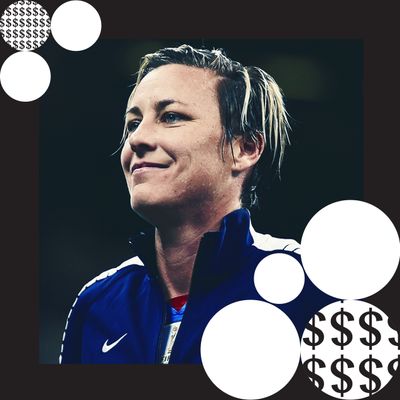
Get That Money is an exploration of the many ways we think about our finances — what we earn, what we have, and what we want. As part of the series, we’re interviewing successful women about how they feel about their bank balances.
Soccer legend Abby Wambach was long regarded as the “soul” of the U.S. women’s national team. A two-time Olympic gold medalist, she holds the world record for international goals for both female and male soccer players. She retired after the 2015 Olympics and has since reinvented herself as an entrepreneur, activist, and New York Times best-selling author. We spoke to her about retiring at 35, her expensive watch habit, and why she tries not to dwell on the quarter-billion dollars she didn’t earn.
Her latest book, Wolfpack: How to Come Together, Unleash Our Power, and Change the Game, comes out on April 9.
You grew up the youngest of seven children. Was money scarce in your house?
My dad was a self-employed farmer. He sold farm garden supplies and vegetables, basically in a little farm market. He worked hard, but my mom worked probably way harder, raising seven children. When I was young, my mom told me, “Look, I have been completely reliant on your father, and I don’t want that for my girls.” So, my sister Beth is a surgeon, and now a mother of six. My other sister is a teacher, and a mother of two. All of [my parents’] daughters earn money for themselves, and they’re not reliant on anybody else for income.
When you started making big bucks, did you do smart things, or dumb things?
Unfortunately, I have two expensive habits and hobbies. I love watches, and I love cars. I probably wasted quite a bit of money on those things. Now that I have children, I’m like, “Wow, what an idiot I am. I should have just started putting this money away for their college futures.” My period of earning as an athlete is so small, and if you were even to get more micro on that, my period of actually earning big, life-changing dollars is even smaller. It’s almost luck, whether you score or not.
Is it true you have a special card that gets you a free burrito a day from Chipotle?
Not anymore, but I used to.
They cut you off?
I love Chipotle. I used that card a lot. It stopped working after I retired. I was like, “Wow, that happened quick.” When something like that ceases to continue, you just have to thank your lucky stars that it happened at all. I was proud of it, like, I’ve got a Chipotle card!
What was it like, retiring at 35?
When I retired, I did not have enough money to retire for the rest of my life. I needed to figure out something else to do — not just because I wanted to make the world a better place, but out of need. People are like, “Oh wow, you won gold medals, and World Cups, and you played on the Women’s National Team — you’re famous, and you’re going to be rich forever.” It’s one of the most frustrating things. Even my family, they think I’m super wealthy. But the truth is, when you retire at 35, you have to plan for the next 40, maybe 50 years. I’ll be retired from soccer for way longer than I ever was able to earn any money [in it]. The reality is, I only earned money for 14 years playing the sport. I think 80 percent of all professional male athletes go broke, right? There’s some crazy high statistic. For female athletes, it’s even harder, because we’re starting with fewer dollars to begin with.
How did you supplement your income as a soccer player?
Dare I say the word “brand”? I hate that word, but essentially each player has to build her own specific brand that can appeal outside the confines of U.S. Soccer. What will a sponsor pay you to endorse their product? What will they pay you to come speak to their workforce? As high as you can get that number — that essentially becomes your personal market value.
You did have some pretty lucrative endorsement deals. Does one stand out as a game changer for you?
I didn’t really start earning any actual dollars until 2011, when I was 30 years old. That’s when the Women’s World Cup in 2011 happened, and I scored this big goal against Brazil in the waning seconds of the final. We actually didn’t even win that World Cup. But that changed things for me.
Looking back, that period of my life was pretty damn good. I remember signing some deals that I couldn’t believe. I was signing a $50,000 deal with a company to do one day of work. For me, that’s life-changing money — money I didn’t expect to earn that year. If you sign ten, 15, or 20 of those in the next year, leading up to the 2012 London Olympics? Not winning that 2011 World Cup was actually probably the best thing that ever happened to me, because it also made me really hunker down in the lead up to the 2012 Olympics. We thankfully won that gold medal.
What was the hardest thing to walk away from when you retired?
One of the hardest was the constant paycheck. I know that sounds lame. The reality is I was so worried about not making X while I was walking into my retirement that it actually brought up serious trauma for me. I felt very alone. I went into a severe depression on a lot of levels. When I was able to come out of that depression, and solve for X, figure out what I wanted to do for the rest of my life, that’s been part of my plan: To create a space for any retiring female athlete who wants to get their foot in the door of the corporate world. My business, Wolf Pack Endeavor, goes into the corporate world and teaches leadership programs with an athletic mindset. Pro athletes, especially those who rise to the top, are such great leaders, and they don’t even know that they have this gold. These women are already prepped: They’re able to handle time management and people. That’s such a magnet. So, I’m able to employ some of my teammates, even if it’s just to give them a little bit of a cushion.
Have you ever laid in bed, stared at the ceiling, and calculated how much more money you’d have if you were a male player?
Oh my God. I have scored more goals internationally than any other man or woman — I think I’ve scored 80 more points than the next man. I think I could have made, I don’t know, a quarter of a billion dollars? Cristiano Ronaldo signed a billion-dollar Nike lifetime deal, and he’s made hundreds of millions of dollars. It’s not something that keeps me up at night, but it’s a reality: If I were born a boy, and played professional sports as a man, I would be a millionaire hundreds of times over, for sure.
That’s a lot of cars and watches.
Here’s the deal. I have everything that I possibly could need, and I truly mean that. Aside from maybe a Land Rover Defender, a 1997 old-school Jeep.
A huge pill I needed to swallow early on was that, though I achieved high levels of success and got the same award as Peyton Manning and Kobe Bryant, standing on the same stage, the three of us walked into very different retirements. Their hustling days were over, and mine basically were just starting, because I had to re-create myself. A terror really came over me, the realization that, “Wow, I’ve got to start over. What am I going to do?” I basically dedicated the rest of my life, since that moment, to making sure that the Alex Morgans and the Megan Rapinoes of the world don’t have that fear factor that I had, even after winning everything that I possibly could win.
Your famous Barnard speech referenced your bank account compared to Bryant’s and Manning’s. I looked them up: Kobe is worth $500 million; Peyton is worth $200 million. After that speech went viral, did you hear from either of them?
Yeah, Kobe and I are actually friends. He’s raising a whole team of girl soccer players at home. I know that these guys are not just fans of me out on the field, but they believe in the things that I am fighting for. And I believe that Kobe and Peyton earned every single one of the dollars that they earned, right? Two things could be true at the same time.
The longstanding argument is, “Well, the men’s team brings in more dollars.” Right?
It’s just not true. The real story is that, the Women’s National Team has not only had more success, but also has, in recent years, actually had more financial success than the Men’s National Team. Two plus two doesn’t equal four anymore — so what now? What is U.S. Soccer gonna do? Are they going to step up, and pay the women what they deserve?




